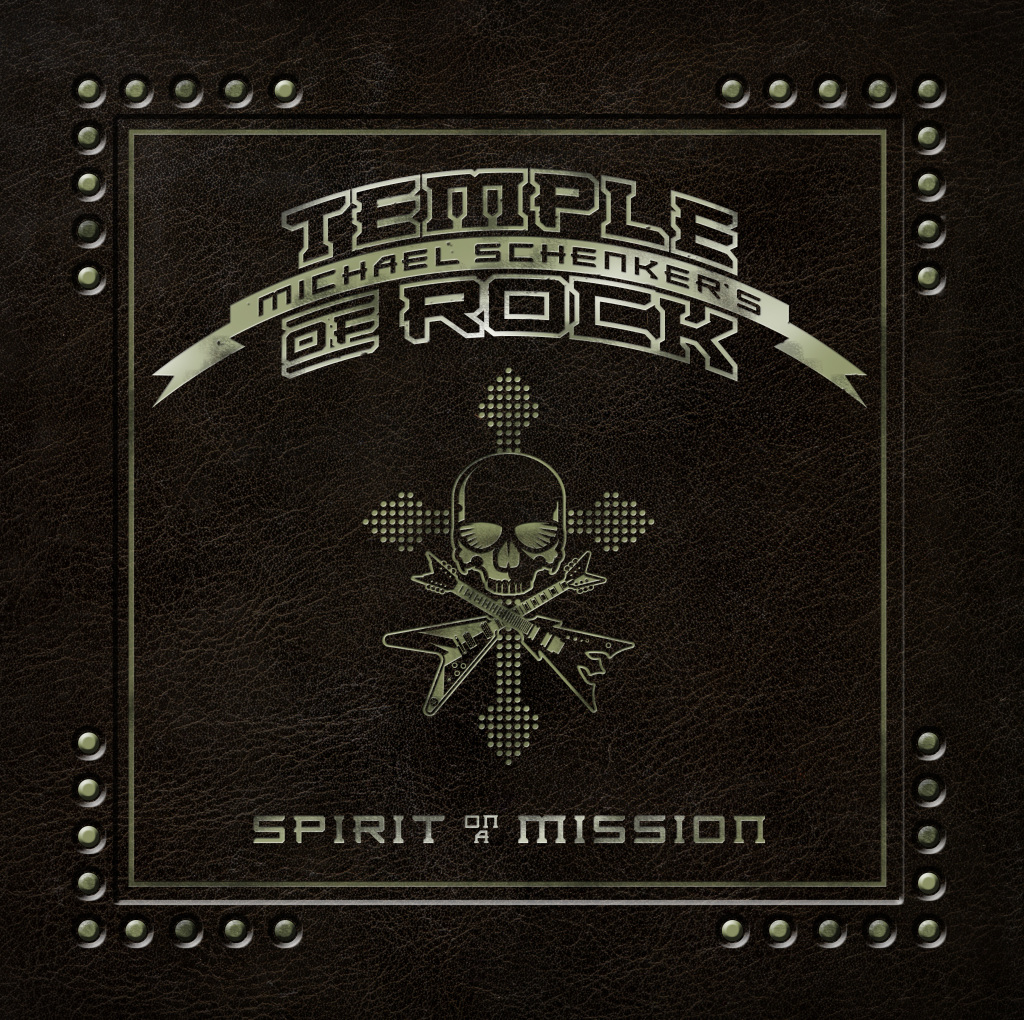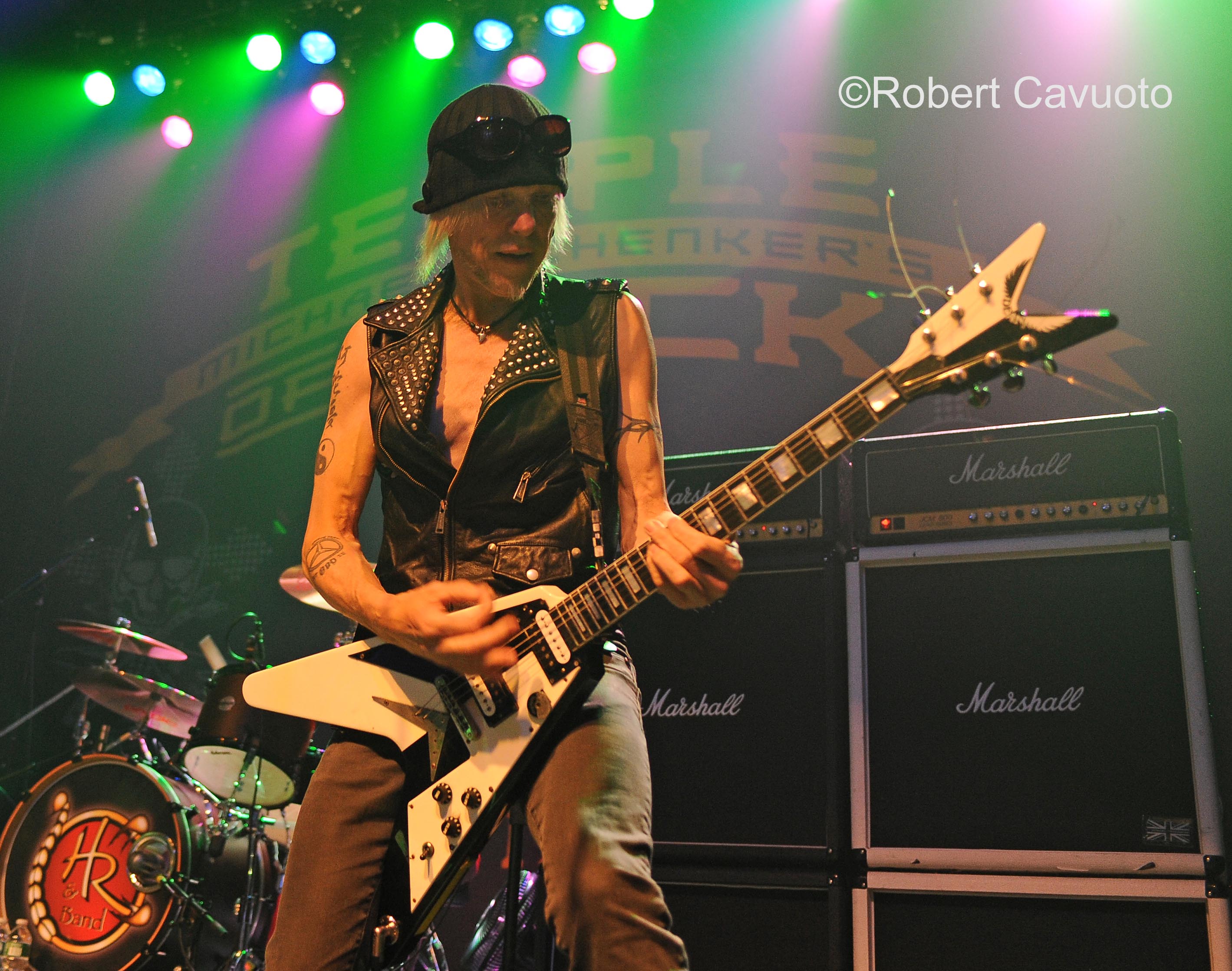By: Robert Cavuoto
Few rock guitarists have an impressive resume like Michael Schenker – from UFO, to the Scorpions, to the Michael Schenker Group; he has influenced generations of guitarists.
With his Temple of Rock line-up, including former Scorpion’s rhythm section; Herman Rareball and Francis Buchholz, the band is now complete and rounded off with Doogie White on vocals, and Wayne Findlay on 7-string/keyboards.
Together they are poised and ready to release their second CD; Spirit on a Mission, this March.
Where his 2014 CD, Bridge the Gap, left off, Spirit on a Mission continues with strong melodic songs and solos that are symphonies unto themselves – something that makes Michael great.
The more I listen to this CD, the more magnificent it becomes as I hear new aspects or “sprinkles” (as Michael puts it), on every song. Dare I say it has a little more of a Rainbow flare with a fluid Blackmore-esque playing style than the last CD.
I caught up with Michael to talk about the band’s legacy, their new CD, and how they expect to finally take the U.S. by storm this Spring with a tour.
******
 Robert: Cavuoto: When we spoke last year, you mentioned the Temple of Rock band was the closest you have ever come to a true band; I was thrilled to see the same line-up on Spirit on a Mission.
Robert: Cavuoto: When we spoke last year, you mentioned the Temple of Rock band was the closest you have ever come to a true band; I was thrilled to see the same line-up on Spirit on a Mission.
I can only assume things are going well.
Michael Schenker: I already knew that I would take this band to the next level from Bridge the Gap. We added more 7-string guitars to this CD. We also connected all the emotions from the last 40 years of knowing each other.
Robert: How does this line-up rate to some of your earlier solo bands?
Michael Schenker: It’s chemistry, people are who they are. When you connect different people you get different results. If you put five great musicians together it doesn’t mean that you will get a great outcome. There is more than meets the eye [Laughing].
Different people add different qualities and colors by how they look at things. It’s always a different chemical reaction when we mix.
After Herman Rarebell and Francis Buchholz made the Scorpion’s Love Drive CD, we didn’t work together for a long time due to different reason, but here we are again making our second CD together.
Robert: You’re finally bringing Herman and Francis to the U.S. this Spring, something that didn’t happen in 2014.
Michael Schenker: This is the first time we are bringing this line-up to the states.
I decided to do a smaller scale tour last year to introduce Doogie when the album was released. We then tried for Spring of 2014, but it never happened. It’s a little late, but better late than never. So here we come in 2015!
Robert: Last year you mentioned that you were under the gun to get Bridge the Gap completed so you came up with the riff and showed the band, what was the creative process for this Spirit on a Mission?
Michael Schenker: It’s still the same platform based on my concept; I knew what I wanted to do right after Bridge the Gap. I asked Wayne to write some songs for the 7-string guitar with a particular type of sound and combine it with some mid tempo songs to cover all bases.
We are coming into our own as a Temple of Rock band. We aren’t there, but we are “bridging the gap” [Laughing] as we are always on the other side.
Robert: “Let the Devil Scream” really showcases Wayne’s writing and 7-string abilities, it’s a crushing song.
Michael Schenker: It wasn’t planned to sound like that, but when I listen to it now it reminds me of a modern ’70s song and the irony being that they didn’t have 7-strings in the ’70s [Laughing]. It makes the song even more interesting.
 Robert: Have you ever played and recorded with a 7-string guitar?
Robert: Have you ever played and recorded with a 7-string guitar?
Michael Schenker: As far as I can remember in 2005 I was working with the 7-string, I knew it wasn’t for me. [Laughing]. I felt I should stay with what I started off on! I watched Wayne develop on the 7-string, so the time was right for him to contribute to our music.
Robert: Herman’s drum playing is quite heavy; did that come natural to him as it was different from what he has done with the Scorpions?
Michael Schenker: [Laughing] Herman is with a metal band now! He has to adapt a little. I really wanted a lot energy on this CD; I didn’t want lame mid-tempo song after song. We would get bored. I told Herman, “The older you get the better it gets, let’s do it!” [Laughing]
Robert: Do you feel your playing technique has changed from UFO to the Scorpions to MSG to Temple of Rock?
Michael Schenker: When I play, I discover – that’s my passion. I learn and develop with each CD I make. I add new sprinkles on it and at a period of time there are so many sprinkles that it becomes different from what I have done in the past.
I haven’t changed, but I have developed as a musician, as well as in other areas. I’m in the middle part of my life, doing a little bit of experimenting and learning. I now have many room of creativity. I’m always moved to create something new.

Robert: I find that guitarists tend to over think songs and sometimes lose sight of what they’re trying to accomplish. Your songs always have the basis of a great riff. How important is great riff writing songs.
Michael Schenker: As an artist you have to do what you want to do. Do what excites you. If it’s a riff, or a melody, or something complicated; there is no right or wrong. It’s about expression. And that’s what we do, we add color to life.
When we self-express, a new color is being born for people to enjoy. There’s no good or bad just preferred. I think you have to trust your feelings in what excites you and that will inspire you to do something unique.
Robert: That’s great advice, I speak with so many established guitarists who are inspired by your playing and site you as a major influence. What do you think of those allocates?
Michael Schenker: I never knew that was the case until the early ’90s. It was never my focus when I was first starting playing. It was all about playing guitar and that is where my passion has always been. That’s the treasure and reward for me.
And, of course, having such an impact, it shows how self-expression is very important and powerful. I did that instinctively when I was young and stopped listen to other music which kept me fresh and allowed me to create my own style. The more you share from within, nobody can do that except you. Nobody has access to that and who ever chooses that will create a richer life and product.
Robert: You have played with so many great vocalists like Gary Barden, Robin McAuley and now Doogie White. What have each brought to the vibe of band with their writing and voice?
Michael Schenker: Again it’s about that chemical reaction we spoke of earlier, when I work with Gary something different comes out of the music than with Robin or Doogie. Same with Phil Mogg or Klaus Meine.
Robert: Herman told me a while ago that he was looking to put together a band with you, your brother; Rudolf Schenker and Pete Way, is this how Temple of Rock got started?
Michael Schenker: What happened was Herman and I were both invited to a Scorpions show in Greece and he said, “Why we don’t we do something together.” He and I met up in in Brighton and somehow Pete Way of UFO showed up. We thought why don’t we put together a project and call it “Strangers,” since I had been playing a lot of the UFO material at the time.
Turns out I was making a demo in the studio and they both wanted to do the rhythm section. I asked Michael Voss to sing. It’s always a great thing when something like this happens unplanned.
Then externally things started to change like Michael Voss wanting a solo career. I had to improvise and have Michael sing with us in Japan and Doogie in Europe. Then Pete Way started to get ill and I asked Herman to call up Francis since we are doing a bunch of Scorpion songs. That’s how we came about, step by step.
Since 2008 I knew I needed to be back in a band as I found enjoyment being on stage. I also saw people were starting to die like Gary Moore, Ronnie James Dio, and John Lord. It made me realize that what we had done was just going to be become memories. I needed to be back in a band.

 Robert: From what you just described, it has to be challenging dealing with all these issues and line-up changes. Does it ever get exhausting keeping it all together?
Robert: From what you just described, it has to be challenging dealing with all these issues and line-up changes. Does it ever get exhausting keeping it all together?
Michael Schenker: If you can stop worry about those things, anything is possible. To not let these problems consume you because they can, but to let the music consume you and focus on the love of creating with that positive energy.
It’s like eating chocolate; you only need to eat a little to enjoy it. That’s what keeps it fresh for me. I’ve never let it get to that point. I have nothing to lose; I don’t have to worry because I’m in the middle of my life. It’s a good place to be and [I’m] reaping the benefits of it.